The Super Smash Bros. franchise is one of the most successful series of games from Japanese video game publisher and developer Nintendo. The most recent entry in the series, Super Smash Bros. Ultimate, has sold nearly 34 million copies, making it one of the biggest releases for the Nintendo Switch and the 19th best selling video game of all time.[1] Many people are likely familiar with the series as a fun crossover of all of Nintendo’s biggest franchises in one game, from Mario to Pokemon to Legend of Zelda. In addition, the game boasts some truly unexpected third-party representation, such as the recent addition of the character Steve from Minecraft. The game features an astounding total of 89 characters from across 40 different game franchises—an impressive Intellectual Property accomplishment in itself.
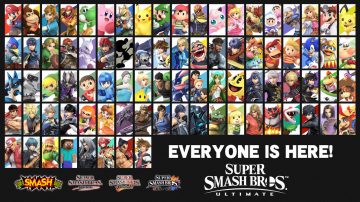
Smash Ultimate’s 89-character roster
A feature that is perhaps less known about the series, however, is its popularity as a competitive esport. Tournaments organized by community members regularly see entrants in the thousands, as well as live viewer numbers in the tens of thousands, which, although smaller than some of the more well-known esports games like League of Legends, represents a substantial following. The series is currently ranked as the 24th biggest esport by peak viewership in 2024.[2]
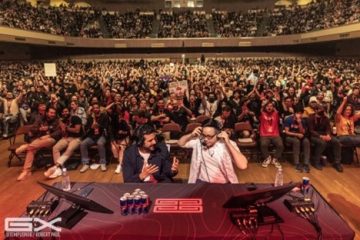
The crowd at Genesis X, the biggest Smash tournament of 2024
Smash Bros. Melee
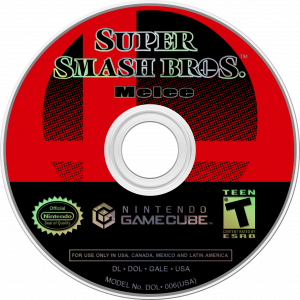
Super Smash Bros. Melee for the Nintendo GameCube
An interesting feature of the Smash community is that its player base is split between two of the series’ titles: Smash Bros. Ultimate, the newest release which came out in 2018 for the Nintendo Switch, and Smash Bros. Melee, which was released over 20 years ago in 2001 for the Nintendo GameCube. Smash Bros. Melee maintains an active and ongoing competitive scene, despite the game no longer being available for sale. The reason for the rift in the community is that many of the series’ more “hardcore” fans prefer the gameplay and speed of Melee compared to its sequels, which have tended towards more casual gameplay meant to appeal to a wider audience. Nintendo, for its part, has generally been hostile toward the competitive Smash scene and its use of their IP, particularly for Melee. This has resulted in a community and esports scene that has impressively managed to stay afloat despite constant challenges, all built around a game which is no longer supported by its developer. Modders and programmers in the Melee community have even been able to develop a way to play the game online using emulators on PC in conjunction with a mod called Slippi–though this has created its own legal issues with Nintendo.
Smash as a “Grassroots” eSport
Both the Smash Bros. Melee and Smash Bros. Ultimate communities, (collectively “the Smash community”) are known as “grassroots” esports communities, meaning that the scene exists and operates independent of developer support.[3] Esports tournaments differ from traditional sports tournaments due to the copyrighted nature of the games in question. Nobody “owns” football or hockey, but game publishers do own and control their video games.[4] This distinction raises a host of issues surrounding publishers’ rights over their games. Some publishers host their own tournaments to maintain complete control over the use of their game, such as Riot Games hosting regional finals and yearly championship tournaments for League of Legends. However, as previously mentioned, Nintendo has historically provided little support for its competitive scenes, at times even actively working against its fanbase through its aggressive copyright enforcement and refusal to grant licenses.
Intellectual Property Issues
The Smash Bros. series and its copyright is entirely owned by Nintendo, a developer that has historically been considered by many to be overprotective of its IP, to the point of near hostility to its own fans. The company has consistently used the threat of legal action to target fans making mods of their games,[5] YouTube uploads of their games,[6] fan projects that use Nintendo-owned characters and IP to create new games,[7] and notably, the competitive scene for the Smash series. There are three particular copyright and IP issues that are implicated regarding the Smash community and its use of Nintendo’s IP: firstly, there is the question of whether video game tournament broadcasts constitute copyright infringement, and if so, whether they might fit under fair use or fair dealing. Second is the legality of modding copyrighted games: Smash tournaments often use mods to help fix technical issues and ensure competitive fairness, though whether these mods constitute an infringement is somewhat unclear. Lastly, and somewhat related to the previous issue, is the legality of video game emulation, a practice that is required to play Melee online, with which Nintendo appears to take issue.
Broadcasting Game Tournaments
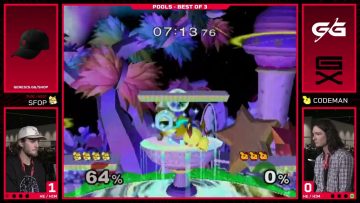
Smash tournaments are streamed live on Twitch or YouTube
The first issue to address is whether it is legal to even broadcast or stream these tournaments without a license. Section 13(4) of the Canadian Copyright Act provides for assignments and licenses of copyrighted works. It is not uncommon for publishers to require tournament organizers to apply for licenses in order to host tournaments, outlining the permissible uses of the publisher’s copyrighted works. However, would it be copyright infringement to broadcast these games without a license? In both Canada and the US, there is a distinct lack of litigation surrounding the streaming and uploading of video game content in general, such as “Let’s Play” videos, and whether they would fall within fair use (in the US) or fair dealing.[8] The reason for this lack of court cases on the subject is generally thought to be that game developers actually see a boost in sales through the increased awareness of their games generated by popular gaming content, so taking these videos down would be counterproductive.[9] For years, Nintendo in particular was known to take down YouTube content surrounding their IP, but even they seem to have come around in recent years, seemingly recognizing the benefits that gaming content can bring.[10]
With all that said, there is no clear answer as to whether video game tournaments, or gaming content in general, falls within fair use or fair dealing. In Canada, it may be even more difficult to argue fair dealing compared to fair use in the US, since none of the enumerated categories in ss. 29-29.2 of the Copyright Act appear to be a particularly good fit.[11] Because of this, it would be risky for tournament organizers to attempt to run an event without a license and expose themselves to legal liability, especially considering Nintendo’s willingness to send cease-and-desist letters to organizers doing just that.[12]
Emulation and Modding
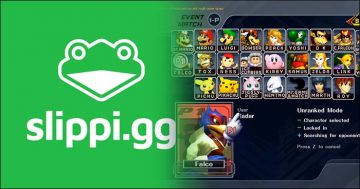
Slippi, a popular mod for Melee that allows for online play
Two other issues of particular relevance to the Melee community are the legality of modding and emulation. Modding is the practice of modifying game content to improve or change it in ways the developer did not intend. Melee, being a 20 year old game, has a number of technical issues that fans have found ways to fix using mods. For instance, a popular Melee mod used at tournaments called “Universal Controller Fix” aims to fix discrepancies between different controllers in order to equalize the playing field between competitors.[13] Emulation, on the other hand, is the practice of using a piece of software known as an emulator in order to play a game on a different system than was originally intended. For example, the popular mod for Melee that allows players to play the game online, Slippi, requires an emulator to use on PC. Nintendo has recently come out taking a hardline stance against modding in its recent guidelines,[14] and has previously shut down tournaments for using mods and emulation in the past,[15] so these issues are worth discussing in the context of copyright law.
Emulation of video games involves two distinct parts. In order to emulate a game, a user requires an emulator, and a ROM (read-only memory) file—essentially a copy of the game files. While the matter has not been litigated in a Canadian court, some comparisons can be drawn to Nintendo of America v King (2017 FC 246), which appears to suggest that software code underlying consoles and video games attracts copyright protection.[16] It is interesting to note that US courts have held that emulators actually do not infringe copyright if they are using unique software and not copying any of the console’s code.[17] The use of ROMs, on the other hand, is somewhat of a gray area. It is almost certainly copyright infringement to download ROMs from the internet via unauthorized third-party websites, however there may be some room to argue that the interoperability of computer programs defense (Copyright Act RSC 1985, c C-42, s. 41.1(1)(c)) could be used to justify “ripping” the files from one’s own legitimately owned copy of a game in order to use it on a different system.[18] To the extent that the popularity of Slippi and other emulators encourage piracy, it is understandable that Nintendo may want to prevent their use. However, emulators on their own might not be enough to infringe copyright—though this remains to be seen in Canada.
The legality of mods in games is another topic of much debate and discussion. Game modifications are likely to be considered a prima facie infringement of copyright due to reproducing and using the game’s copyrighted code.[19] It could be argued that mods are fair dealing, but again, they do not appear to fall within any of the enumerated categories. If mods were able to make it to the second stage of the fair dealing analysis (perhaps through the category of research or education if anything?), it could be argued that the effect of the dealing on the work would be minimal.[20] Mods generally require users to already have a copy of the game in order to use, so they would not be cannibalizing any market share of the games on their own. Some game developers are very supportive of mods being created for their games,[21] and mods are viewed by many as a positive force that encourages creativity and improvement on the original product (almost like patents!), so perhaps this is an area in which User’s Rights and fair dealing could be further developed in the future.
These are some of the central legal issues that have come up regarding the Smash community’s use of Nintendo’s IP, and how they might be dealt with in Canadian copyright law. Now, we will analyze the most recent developments in Nintendo and the Smash community’s rocky history.
Latest Development: Community Guidelines
From October 20th-22nd 2023, one of Smash’s biggest and longest-running tournaments, The Big House, returned for its 11th year running. The Big House 11 surpassed 1000 entrants, being one of the most prestigious tournaments of the year with all of the game’s best players in attendance and attracting players from all over the world to compete. The weekend was filled with nail-biting sets, electrifying performances, and major upsets. The winner of the tournament tore through the losers bracket with an 11-set win-streak to take the tournament, a historical performance widely viewed as one of the greatest losers runs of all time. The community celebrated the triumphs and underdog stories of the weekend, but most importantly, fans rejoiced in the fact that against the odds, the competitive scene was still very much thriving 22 years after the game’s release.
On October 24th, just two days after the tournament, celebrations were cut short as Nintendo dropped a bombshell on the Smash community, announcing new guidelines that would place heavy restrictions on many tournaments moving forward.[22] The guidelines were published on Nintendo’s Japanese, European, North American, and Australian websites. Nintendo has long been criticized for its antagonistic and restrictive approach to esports events that feature its titles. Over the years, the community has seen it strictly control how events are run, providing extremely little support for the competitive scene throughout the decades. There is a long-running joke among fans that nobody hates Nintendo fans more than Nintendo itself. While met with widespread backlash, this was far from an uncharacteristic move from Nintendo.
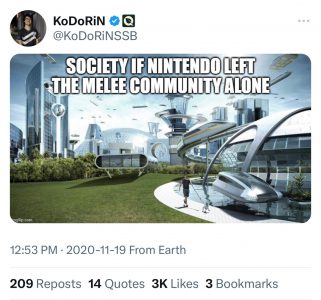
Community response to the new guidelines
So what exactly were these new guidelines that had the community up in arms? Except where expressly permitted by Nintendo, the new Community Tournament Guidelines and Licensed Tournament Guidelines placed restrictions on number of entrants, entry fees, spectator fees, prize pools, revenue generation, and sponsorship arrangements, among other things.[23] The guidelines also prohibited organizers from using modified versions of games and using unauthorized accessories. While many game publishers have guidelines for events that are run using their titles, Nintendo’s criteria were seen as overly restrictive in comparison. The announcement was met with immediate and intense backlash. Esports journalist and analyst Rod Breslau commented in response to the announcement that “Nintendo is the only game developer to consistently not just be disinterested and unsupportive about its own longtime dedicated competitive players, but will actively go out of their way to screw them over.” Harris Peskin, an esports lawyer at ESG law, commented “Absent permitted exceptions by Nintendo, these restrictions would have the effect of significantly damaging the Smash ecosystem. What remains to be seen is how liberal Nintendo will be in handing out the exceptions.”
Sponsorships & Monetization
Per the Licensed Tournament Guidelines, tournament organizers may not receive goods, services, money, etc., from third parties as sponsors except when explicitly approved by Nintendo and tournaments may not have sponsors that advertise or promote any entity, products, or services. This is in stark contrast to other game publishers’ guidelines such as Epic Games’ Fortnite Event Licenses or EA’s Apex Legends Community Tournament Guidelines that have no maximum cap on sponsorships. Sponsors have long played a crucial role in running tournaments, providing financial support as well as bringing credibility and legitimacy to grassroots events.
Absent an explicit exception from Nintendo, tournament organizers are permitted to generate revenue in three different ways, subject to limits:
- (1) Organizers can monetize the posting of images and videos related to the Licensed Tournament on their personal accounts up to a maximum of $10,000 in a 12-month period.
- (2) Organizers may collect entry fees from Participants in an amount not more than the equivalent of $20 (USD) per person.
- (3) Organizers may collect an admission fee from Spectators of not more than the equivalent of $15 (USD) per person.
These hard limits on revenue generation and sponsorships raised concerns that some tournaments would no longer be able to break even financially as tournaments can be exceptionally costly to run. These restrictions on monetization and sponsorships are rarely seen among other game publishers. Riot Games’ Tier 2 License imposes no upper limit on revenue generated through advertisement.
Prize Caps
The guidelines impose a $5,000 prize limit per tournament and a $10,000 limit per 12-month period. It is unclear whether these limits apply as a single prize offering to entrants or as a total prize pool to all entrants. This is in stark contrast to many esports that regularly see prize pools in the hundreds of thousands, if not millions of dollars. Smash is already a game in which it is notoriously difficult to make a living. Many of the game’s top players have expressed their frustrations about the financial difficulties associated with competing in Smash and have considered leaving the game for more stable ventures.
Modded Software
Nintendo has made it clear that the use of modified software is not permitted in Licensed Tournaments. While less of a problem for in-person tournaments, fans were concerned that this spelled the end for any online events using Slippi. Most notably, Nintendo’s guidelines led to the shutdown of Melee Coinbox, a popular bi-weekly online tournament with a $3000 prize pool.[24] Organizers were forced to discontinue the event as Slippi violated Nintendo’s prohibition of modified software, despite being impossible to play online without it. This was a stifling blow to the community, leaving many players uncertain about the future of online Melee events.
Reception & Aftermath
The new Nintendo guidelines were criticized as a form of corporate overreach and raised concerns regarding users’ rights. Montana State Representative Zooey Zephyr criticized the new guidelines, saying, “Imagine Bicycle Playing Cards insisting your home poker games be played a certain way or they’ll sue you. Ridiculous. Customers have every right to use these products how they see fit.” On November 16, 2023, the Norwegian Consumer Council also filed a formal complaint against Nintendo over the guidelines, claiming that changing the terms of service in such a manner for products that customers had purchased years prior violated consumer protection laws.[24] This complaint is still ongoing.
In Canadian copyright law, the concept of users’ rights flow from Théberge v. Galerie d’Art du Petit Champlain inc., where copyright was found to balance the interests of copyright owners and the interests of users.[25] However, as previously discussed, the hosting, playing, and broadcasting of video game tournaments does not easily nor squarely fall into any one of the eight enumerated fair dealing categories, and it may be challenging to make a compelling fair dealing defense, especially given the commercial nature of many tournaments. As esports and gaming communities at large continue to evolve and innovate, it may be time for policymakers to revisit the scope of fair dealing and ensure that users’ rights are adequately accounted for in the digital age.
Some supporters of the guidelines expressed that the new guidelines finally gave tournament organizers a clear way to obtain licensing. Alex Jebailey, founder of CEO Gaming, responded positively to the announcement, predicting that this provided a streamlined process for established events to obtain a license. However, Nintendo has historically offered scant support for the competitive scene, and the community is all too familiar with having events canceled due to Nintendo’s refusal to grant licenses. In 2022, it was announced that the 2022 Smash World Tour Championships (the biggest event in Super Smash Bros. history in terms of prize pool) as well as the entirety of the 2023 Smash World Tour was canceled after Nintendo refused to grant a license, a decision that was widely characterized as unfair and unreasonable among organizers and fans. Nintendo did not provide reasoning for its refusal to grant the license.[26]
As of April 2024, major tournaments have seemingly been able to obtain licenses and exceptions from Nintendo in accordance with the new guidelines. Genesis X, the biggest tournament of 2024, had over 1500 entrants, had a $23,160 USD prize pool, and charged entry fees starting at $125 USD and spectator fees starting at $50 USD, among other exceptions to the guidelines. While the guidelines have only been in effect for several months, it doesn’t appear that Nintendo has unreasonably denied any licenses or yet caused any in-person events to be canceled. As of this writing, the most notable implication of the new guidelines is the complete discontinuance of online Melee tournaments, but as stated, in-person events have largely been left intact. Despite lingering skepticism and mistrust from the community at large, there remains a cautious optimism that Nintendo’s guidelines may ultimately be a positive step towards reconciling its relationship with the Smash community.
References:
[1] “IR information : Sales Data – top selling title sales units”, online: Nintendo Co, Ltd <https://www.nintendo.co.jp/ir/en/finance/software/index.html>.
[2] “Most popular esports games 2024 | esports charts”, online: Esports Charts <https://escharts.com/top-games?order=peak>.
[3] Barrett, David. “The importance of grassroots in esports”, (22 March 2019), online: Medium <https://dgbarrett.medium.com/the-importance-of-grassroots-in-esports-e9b722cc8f0d>.
[4] Ibid.
[5] Chan, Khee Hoon. “A Snapshot of Nintendo’s Convoluted Legal History”, (14 December 2021), online: TheGamer <https://www.thegamer.com/a-snapshot-of-nintendos-convoluted-legal-history/>.
[6] Bedingfield, Will. “Nintendo’s copyright strikes push away its biggest fans”, (27 April 2023), online: Wired <https://www.wired.com/story/nintendo-copyright-zelda-mod/>.
[7] Otero, Jose. “Nintendo shuts down Metroid 2 fan remake AM2R”, (9 August 2016), online: IGN <https://www.ign.com/articles/2016/08/08/nintendo-shuts-down-metroid-2-fan-remake-am2r>.
[8] Champagne, Alexandra. “Let’s plays: A copyright conundrum”, (19 January 2024), online: Slaw <https://www.slaw.ca/2024/02/07/lets-plays-a-copyright-conundrum/>.
[9] Ibid.
[10] Ibid.
[11] RSC 1985, c C-42.
[12] Robertson, Adi. “Nintendo shuts down Super Smash Bros. tournament for using mods to play online”, (20 November 2020), online: The Verge <https://www.theverge.com/2020/11/20/21579392/nintendo-big-house-super-smash-bros-melee-tournament-slippi-cease-desist>.
[13] SmashWiki. “Universal Controller Fix”, (10 March 2024), online: SmashWiki <https://www.ssbwiki.com/Universal_Controller_Fix>.
[14] “Licensed tournament guidelines and tournament license terms & conditions”, (14 November 2023), online: Nintendo Support <https://en-americas-support.nintendo.com/app/answers/detail/a_id/63653/~/licensed-tournament-guidelines-and-tournament-license-terms-%26-conditions>.
[15] Robertson, Supra.
[16] Penner, Mark D, Mark Vanderveken & Demetre Vasilounis. “Only memories: Intellectual property considerations related to video game emulation”, (19 December 2023), online: Fasken <https://www.fasken.com/en/knowledge/2018/12/only-memories-intellectual-property-considerations-related-to-video-game-emulation>.
[17] Ibid.
[18] Ibid.
[19] Copyright Act RSC 1985, c C-42, s. 27(1)
[20] CCH Canadian Ltd v Law Society of Upper Canada, 2004 SCC 13, [2004] 1 SCR 339.
[21] Marshall, Cass. “Bethesda Shares Plans for Starfield’s First Expansion, Mod Support”, (20 December 2023), online: Polygon <https://www.polygon.com/24010039/bethesda-starfield-end-of-year-update-mod-support-shattered-space>.
[22] Nintendo of America, Supra.
[23] Ibid.
[24] Ashley, Jordan. “Last melee coinbox tournament concludes with a Bang”, (13 November 2023), online: Esports.net <https://www.esports.net/news/fighting-games/last-melee-coinbox/>.
[25] Fossum, Erik. “The Consumer Council: – Will Take Up Nintendo’s Rules with European Consumer Organizations”, online: PressFire.no <https://www.pressfire.no/artikkel/forbrukerradet-vil-ta-opp-nintendos-regler-med-europeiske-forbrukerorganisasjoner>.
[26] Théberge v. Galerie d’Art du Petit Champlain inc., 2002 SCC 34, [2002] 2 SCR 336.
[27] Šimić, Ivan. “Smash World Tour in jeopardy after Nintendo reportedly refuses to grant licence – esports insider”, (6 December 2022), online: Esportsinsider <https://esportsinsider.com/2022/11/smash-world-tour-2023-cancelled-nintendo>.
 Copyright & Social Media
Copyright & Social Media Communications Law
Communications Law